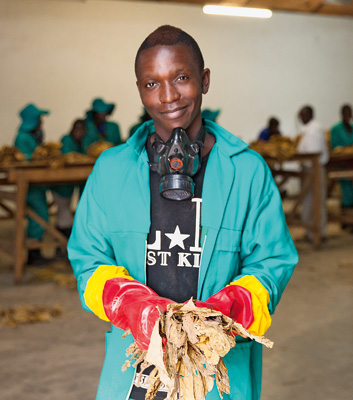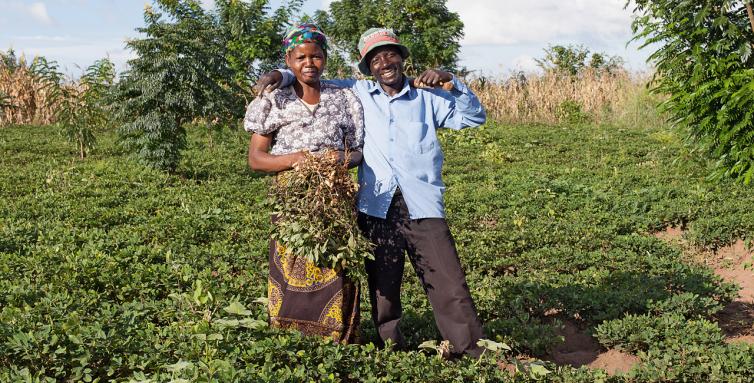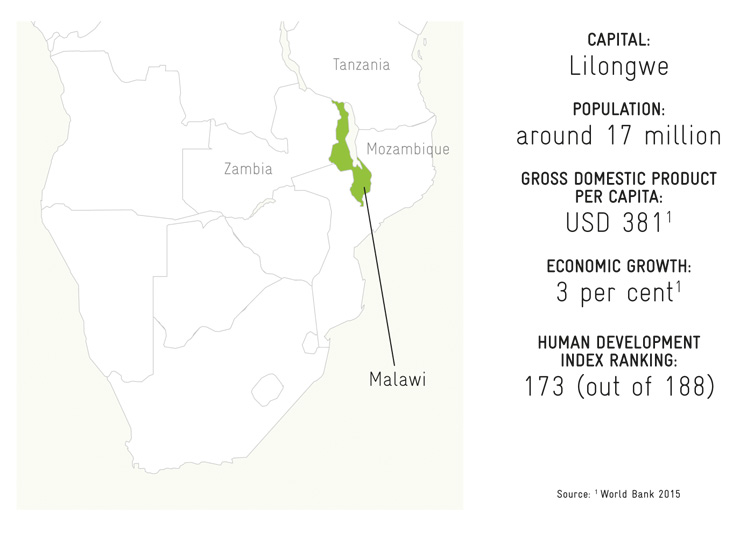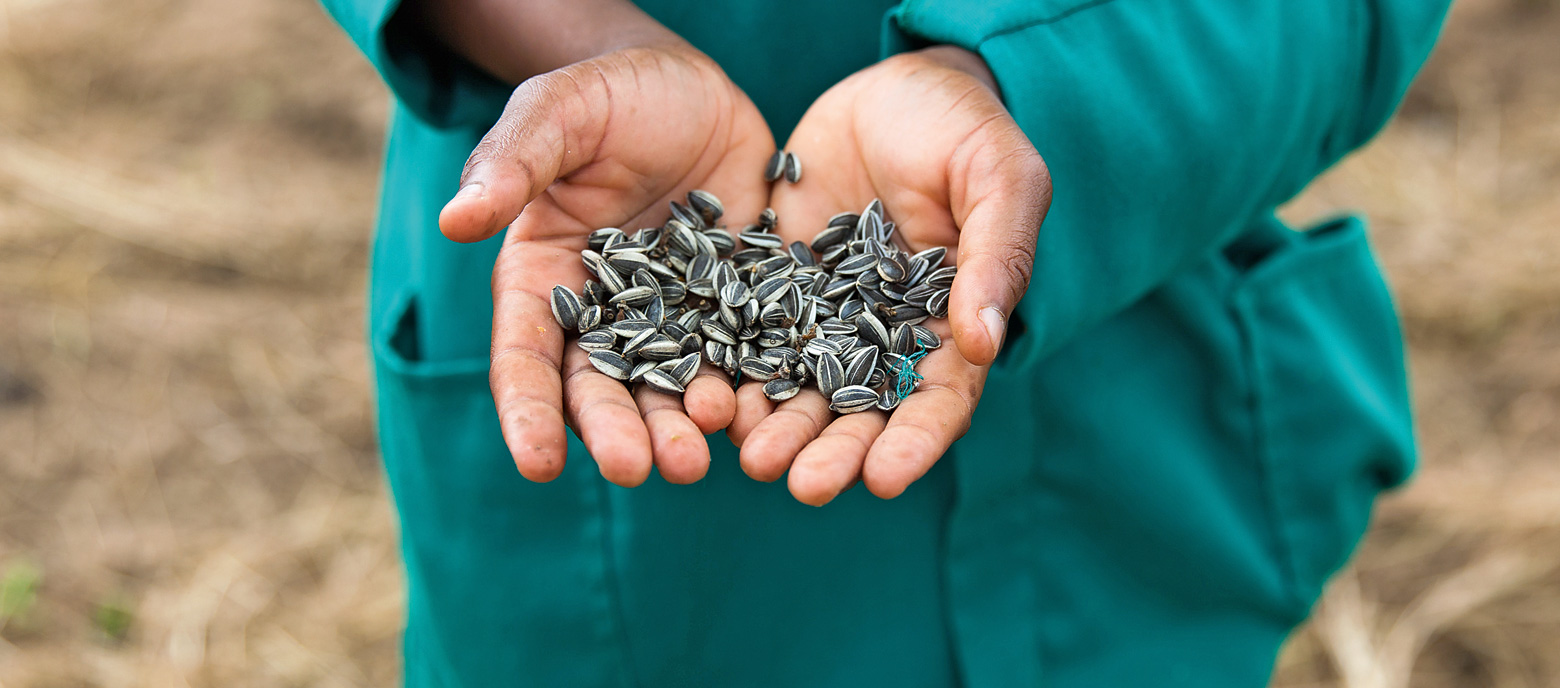Sustainable agriculture
Malawi goes for diversity
In a darkened room, young men and women are busy grading tobacco leaves by quality. They wear breathing masks and rubber gloves. Barnet Magombo finds the protective clothing annoying, but he knows that without it the work is dangerous. The equipment protects them from toxic nicotine, pesticides and dust. Although it is by no means standard in Malawi, here at the Mwimba College of Agriculture it is mandatory.

Magombo is currently undergoing training at the agricultural college in Kasungu District in the country’s Central Region. The 18-year-old has already learned how to harvest and dry the tobacco correctly. Just now, he’s putting processed leaves onto five separate piles and preparing them for delivery. Graded tobacco from all over Malawi is transported to the country’s four auction halls, where it is bought by international tobacco companies, the three largest being Universal Corporation, Alliance One and Japan Tobacco International. Tobacco from Malawi is used worldwide to make cigarettes. But demand for country’s principal export has been in decline for years – and so has its value. The 2016 sales season started with low prices. And despite excellent quality, much of the tobacco failed to find a buyer.
Around 8.5 million people in Malawi are facing starvation
Magombo’s elder sister grows tobacco, and he is following developments with concern: ‘The small farmers are increasingly left with goods on their hands.’ Previously tobacco was a crop that would guarantee a better income than any other product. For generations, therefore, many families predominantly grew tobacco and used it as a source of income. Now their earnings often do not even cover the costs of labour, seed and pesticides.
To compound matters, the country is also battling a food crisis. Aside from the impact the El Niño phenomenon is having on climate, much of the blame for this must be placed on an agricultural system that has failed to diversify. According to statistics published by the United Nations, around 8.5 million people in Malawi – around half the population – are facing starvation as a result of crop failures. The prospects are not good, as Magombo explains. ‘Most farmers are not aware of the risks of monocultures,’ says the prospective farmer. He would advise them to plant other crops along with tobacco, such as peanuts. ‘That way they are less dependent and have a source of food if necessary.’
Edible crops in place of tobacco
Alarmed at the crisis, the Malawian Government has introduced measures to make the country less dependent on tobacco sales. By planting other edible food crops, farmers can generate additional sources of income. So in years when tobacco prices are low, they can still feed their families, and at the same time contribute to improved food supplies across the country. Fallow tobacco plantations present a perfect opportunity to farm edible crops – and regular crop rotation means that soils also remain more fertile.
GIZ is advising the Malawian Government on how to implement its strategy and boost both production and revenues in the country. ‘A network of agricultural advisors, small producers and local food manufacturers will make this possible,’ explains project manager Florian Bernhardt, outlining the approach of the Green Innovation Centres. These are part of the One World – No Hunger special initiative launched by the German Federal Ministry for Economic Cooperation and Development.
The focus is on oil seeds
Two agricultural colleges in Malawi collaborate with German experts to train young, motivated farmers like Barnet Magombo to serve as multipliers. At Magombo’s college, an institution funded by Malawi’s Agricultural Research and Extension Trust (ARET), 200 students have already graduated as agricultural extension officers. As such, they support small farmers across the country with growing not only tobacco and corn, but also sunflowers, peanuts, soya and manioc. The focus is on oil seeds, since these are ideal for further processing within the country’s borders into other goods such as vegetable oil, a product in demand all over the world.
The agricultural economist John W. Jiyani walks through the college campus with a look of satisfaction. After the first year of cooperation with German experts, a great deal is already happening. ‘The library has been equipped with technical books and one building has been refurbished,’ says Jiyani, outlining the new developments. ‘We also have the use of a laboratory and two oil presses, and the campus is supplied with water by a solar-powered irrigation unit.’ But most importantly, the college has broadened the focus of its narrow tobacco-based curriculum to include the cultivation of oil seeds and manioc – both in theory and in practice. Students can now gain extensive experience of both crops out in the training fields. From now on, 120 students will complete the extension training course each year.
Pass on the knowledge about good farming practices
Magombo wants to continue his studies on completing the one-year basic training. In three years he would then be an agricultural extension officer. In this role, he wants to pass on his knowledge about alternative crops and good farming practices to tobacco farmers. And in turn, Magombo wants to learn from them. His dream is one day to buy a piece of land of his own, to employ workers and to manage a sustainable farming business.

![]()
![]()
![]() Picture gallery: Rosemary and Sabnet Thauzeni need no convincing about the benefits of growing a diverse range of crops.
Picture gallery: Rosemary and Sabnet Thauzeni need no convincing about the benefits of growing a diverse range of crops.
The Natural Resources College (NRC) at the University of Lilongwe in the Malawi capital also trains agricultural extension officers. Although tobacco farming still features on the college curriculum, it is no longer found out on the training areas. Instead, these are now thriving with magnificent sunflowers and manioc. In the irrigated garden which forms part of the campus, the lush, green plants stand in neat rows. The college is trialling a drip irrigation technique – with great success. ‘With just a small amount of water we can create a major impact,’ says Timothy Gondwe proudly. Clad in a dark suit, the professor is beginning to feel the midday heat. Pointing to the water tanks equipped with solar pumps, he explains how the college has had to resort to water-saving solutions on account of the impact of climate change. Thanks to two new drying facilities – a solar-powered unit for fruit and vegetables and another dryer for cereals – the harvest can be processed reliably and protected from pests and mould. A motorised hand tractor or rotovator, which is operated like a lawnmower, is also in regular use out in the fields.
Reach as many small farmers across the country as possible
The NRC sees itself as both pioneer and multiplier: ‘We introduce technical innovations, trial them and demonstrate them to farmers’ groups,’ explains Gondwe. By adopting this approach, the experts aim to reach as many small farmers across the country as possible: by 2018 it is anticipated that around 17,000 families will be familiar with the new methods.
The village of Khwidzi is just a few kilometres from the college. The small farmers who live here listen to the advice of the experts. Until now, the village has applied simple farming practices with a clear distribution of roles: the men work the fields with picks and the women fill buckets of water from the wells. The whole village was excited to see the college’s hand tractor in action, because it rendered the task of rotovating the fields much easier. There are already plans for a solar pump for the village’s newly developed water source. The farmers are hoping these changes will result in improved harvests.
Exchange between farmers and students
Students from the agricultural college regularly visit the village. They gather practical experience from the villagers, and in turn make farmers aware of new techniques and approaches. They pass on what they have learned in their studies – such as the use of compost to cut the cost of expensive fertilisers. Rosemary and Sabnet Thauzeni, a farming couple from the village, have already accumulated a small compost heap. Sabnet Thauzeni heads up a group of farmers and has just returned from a training session. ‘Many farmers who only make losses with tobacco are now switching to the less time-consuming and more cost-effective farming of oil seeds,’ he reports.
The Thauzeni’s farm is already very diverse: they grow peanuts, corn and soya, in addition to keeping hens and goats. Sabnet Thauzeni needs no further persuasion: ‘The new crops and improved techniques are really helping to boost an entire village.’
Contact: Florian Bernhardt > florian.bernhardt@giz.de
published in akzente 3/16

NEW KNOWLEDGE
Project: Green Innovation Centres for the Agriculture and Food Sector
Country: Malawi
Commissioned by: German Federal Ministry for Economic Cooperation and Development
Lead Executing Agency: Malawian Ministry of Industry and Trade
Overall term: 2015 to 2019
